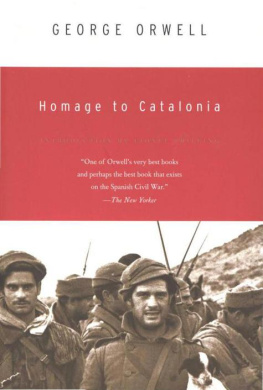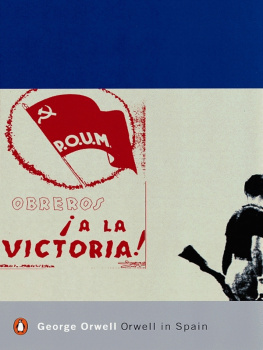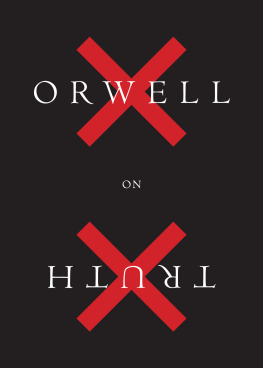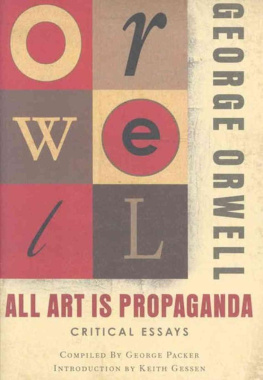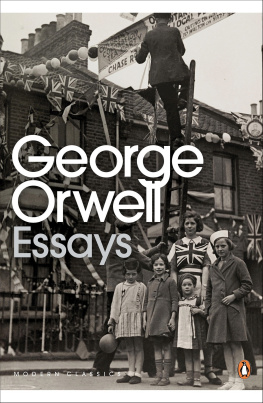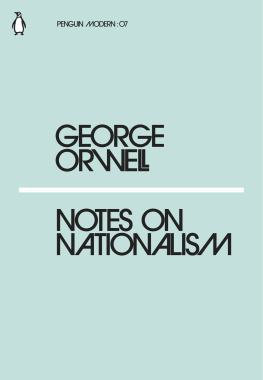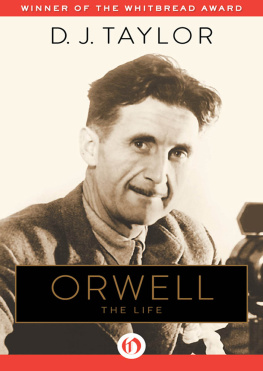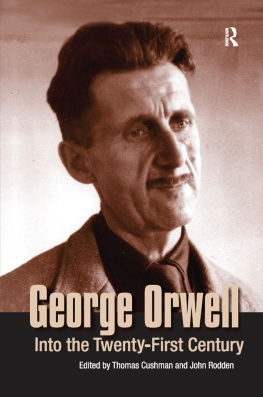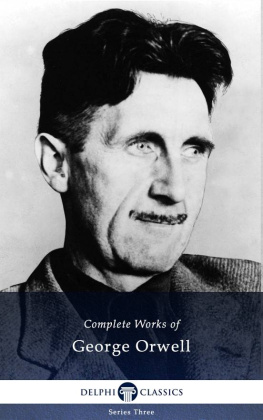George Orwell - Homage to Catalonia
Here you can read online George Orwell - Homage to Catalonia full text of the book (entire story) in english for free. Download pdf and epub, get meaning, cover and reviews about this ebook. year: 2011, genre: History. Description of the work, (preface) as well as reviews are available. Best literature library LitArk.com created for fans of good reading and offers a wide selection of genres:
Romance novel
Science fiction
Adventure
Detective
Science
History
Home and family
Prose
Art
Politics
Computer
Non-fiction
Religion
Business
Children
Humor
Choose a favorite category and find really read worthwhile books. Enjoy immersion in the world of imagination, feel the emotions of the characters or learn something new for yourself, make an fascinating discovery.
- Book:Homage to Catalonia
- Author:
- Genre:
- Year:2011
- Rating:4 / 5
- Favourites:Add to favourites
- Your mark:
- 80
- 1
- 2
- 3
- 4
- 5
Homage to Catalonia: summary, description and annotation
We offer to read an annotation, description, summary or preface (depends on what the author of the book "Homage to Catalonia" wrote himself). If you haven't found the necessary information about the book — write in the comments, we will try to find it.
Homage to Catalonia — read online for free the complete book (whole text) full work
Below is the text of the book, divided by pages. System saving the place of the last page read, allows you to conveniently read the book "Homage to Catalonia" online for free, without having to search again every time where you left off. Put a bookmark, and you can go to the page where you finished reading at any time.
Font size:
Interval:
Bookmark:
Answer not a fool according to his folly, lest thou be
like unto him.
Answer a fool according to his folly, lest he be wise in
his own conceit.
PROVERBS XXVI, 5-6
I n the Lenin Barracks in Barcelona, the day before I joined the militia, I saw an Italian militiaman standing in front of the officers table.
He was a tough-looking youth of twenty-five or six, with reddish-yellow hair and powerful shoulders. His peaked leather cap was pulled fiercely over one eye. He was standing in profile to me, his chin on his breast, gazing with a puzzled frown at a map which one of the officers had open on the table. Something in his face deeply moved me. It was the face of a man who would commit murder and throw away his life for a friend the kind efface you would expect in an Anarchist, though as likely as not he was a Communist. There were both candour and ferocity in it; also the pathetic reverence that illiterate people have for their supposed superiors. Obviously he could not make head or tail of the map; obviously he regarded map-reading as a stupendous intellectual feat. I hardly know why, but I have seldom seen anyone any man, I mean to whom I have taken such an immediate liking. While they were talking round the table some remark brought it out that I was a foreigner. The Italian raised his head and said quickly:
Italiano?
I answered in my bad Spanish: No, Ingls. Y t?
Italiano.
As we went out he stepped across the room and gripped my hand very hard. Queer, the affection you can feel for a stranger! It was as though his spirit and mine had momentarily succeeded in bridging the gulf of language and tradition and meeting in utter intimacy. I hoped he liked me as well as I liked him. But I also knew that to retain my first impression of him I must not see him again; and needless to say I never did see him again. One was always making contacts of that kind in Spain.
I mention this Italian militiaman because he has stuck vividly in my memory. With his shabby uniform and fierce pathetic face he typifies for me the special atmosphere of that time. He is bound up with all my memories of that period of the war the red flags in Barcelona, the gaunt trains full of shabby soldiers creeping to the front, the grey war-stricken towns farther up the line, the muddy, ice-cold trenches in the mountains.
This was in late December 1936, less than seven months ago as I write, and yet it is a period that has already receded into enormous distance. Later events have obliterated it much more completely than they have obliterated 1935, or 1905, for that matter. I had come to Spain with some notion of writing newspaper articles, but I had joined the militia almost immediately, because at that time and in that atmosphere it seemed the only conceivable thing to do. The Anarchists were still in virtual control of Catalonia and the revolution was still in full swing. To anyone who had been there since the beginning it probably seemed even in December or January that the revolutionary period was ending; but when one came straight from England the aspect of Barcelona was something startling and overwhelming. It was the first time that I had ever been in a town where the working class was in the saddle. Practically every building of any size had been seized by the workers and was draped with red flags or with the red and black flag of the Anarchists; every wall was scrawled with the hammer and sickle and with the initials of the revolutionary parties; almost every church had been gutted and its images burnt. Churches here and there were being systematically demolished by gangs of workmen. Every shop and caf had an inscription saying that it had been collectivized; even the bootblacks had been collectivized and their boxes painted red and black. Waiters and shop-walkers looked you in the face and treated you as an equal. Servile and even ceremonial forms of speech had temporarily disappeared. Nobody said Seior or Don or even Usted; everyone called everyone else Comrade and Thou, and said Salud! instead of Buenos dias. Tipping was forbidden by law; almost my first experience was receiving a lecture from a hotel manager for trying to tip a lift-boy. There were no private motor-cars, they had all been commandeered, and all the trams and taxis and much of the other transport were painted red and black. The revolutionary posters were everywhere, flaming from the walls in clean reds and blues that made the few remaining advertisements look like daubs of mud. Down the Ramblas, the wide central artery of the town where crowds of people streamed constantly to and fro, the loudspeakers were bellowing revolutionary songs all day and far into the night. And it was the aspect of the crowds that was the queerest thing of all. In outward appearance it was a town in which the wealthy classes had practically ceased to exist. Except for a small number of women and foreigners there were no well-dressed people at all. Practically everyone wore rough working-class clothes, or blue overalls, or some variant of the militia uniform. All this was queer and moving. There was much in it that I did not understand, in some ways I did not even like it, but I recognized it immediately as a state of affairs worth fighting for. Also I believed that things were as they appeared, that this was really a workers' State and that the entire bourgeoisie had either fled, been killed, or voluntarily come over to the workers' side; I did not realize that great numbers of well-to-do bourgeois were simply lying low and disguising themselves as proletarians for the time being.
Together with all this there was something of the evil atmosphere of war. The town had a gaunt untidy look, roads and buildings were in poor repair, the streets at night were dimly lit for fear of air-raids, the shops were mostly shabby and half-empty. Meat was scarce and milk practically unobtainable, there was a shortage of coal, sugar, and petrol, and a really serious shortage of bread. Even at this period the bread-queues were often hundreds of yards long. Yet so far as one could judge the people were contented and hopeful. There was no unemployment, and the price of living was still extremely low; you saw very few conspicuously destitute people, and no beggars except the gipsies. Above all, there was a belief in the revolution and the future, a feeling of having suddenly emerged into an era of equality and freedom. Human beings were trying to behave as human beings and not as cogs in the capitalist machine. In the barbers' shops were Anarchist notices (the barbers were mostly Anarchists) solemnly explaining that barbers were no longer slaves. In the streets were coloured posters appealing to prostitutes to stop being prostitutes. To anyone from the hard-boiled, sneering civilization of the English-speaking races there was something rather pathetic in the literalness with which these idealistic Spaniards took the hackneyed phrases of revolution. At that time revolutionary ballads of the naivest kind, all about proletarian brotherhood and the wickedness of Mussolini, were being sold on the streets for a few centimes each. I have often seen an illiterate militiaman buy one of these ballads, laboriously spell out the words, and then, when he had got the hang of it, begin singing it to an appropriate tune.
All this time I was at the Lenin Barracks, ostensibly in training for the front. When I joined the militia I had been told that I should be sent to the front the next day, but in fact I had to wait while a fresh centuria was got ready. The workers' militias, hurriedly raised by the trade unions at the beginning of the war, had not yet been organized on an ordinary army basis. The units of command were the section, of about thirty men, the
Font size:
Interval:
Bookmark:
Similar books «Homage to Catalonia»
Look at similar books to Homage to Catalonia. We have selected literature similar in name and meaning in the hope of providing readers with more options to find new, interesting, not yet read works.
Discussion, reviews of the book Homage to Catalonia and just readers' own opinions. Leave your comments, write what you think about the work, its meaning or the main characters. Specify what exactly you liked and what you didn't like, and why you think so.

